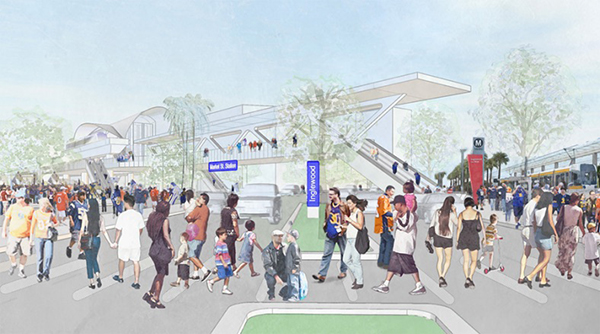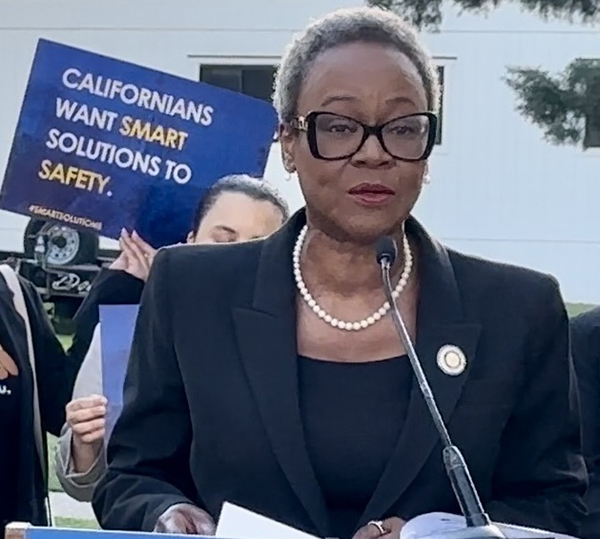By Emilie St. John
Contributing Writer
INGLEWOOD — The City Council has unanimously approved the city Finance Department’s request to adjust how much Inglewood taxpayers will contribute to the ongoing maintenance and operations costs of the Inglewood Transit Connector during the June 20 City Council meeting.
The City has assembled roughly $765 million towards the construction costs of the project, but in order to get the additional $1 billion in federal funding, the city has to demonstrate it has the financial wherewithal to finance the project.
“The action today is needed to demonstrate the project’s 30% operation and maintenance sources of funds as committed to be in compliance with the Federal Transportation Administration requirements,” said Lisa Trifiletti, the lead consultant on the project. “Our goal will be to submit our request for ratings this week to the FTA and this goal is needed to achieve our schedule to be constructed and operational by the [2028] Olympics.”
The city hopes to receive the FTA feedback by the end of July or early August.
“The mayor is continuing to lead negotiations with the venues for their contributions to operation and maintenance, in consistency with our plans, and the negotiations are ongoing and collaborative,” Trifiletti said.
According to a staff report, “the city continues to engage the owners of the venues within the Inglewood Sports and Entertainment District on contributions to support maintenance and operations costs [for the transit connector]. Given that those negotiations are still underway, it is prudent for the city to demonstrate this additional commitment to support the project rating.”
The City Council initially authorized funding in the amount of $7.6 million in May and that number has now swelled and additional $1.5 million to $9.1 million.
“The fact that we are optimistic about the project but of course this money would not be coming from the general funds, it would be revenue producing funds, if in fact the project goes through,” Councilwoman Gloria Gray said. “I want to reiterate the venues involved in this discussion, with the mayor, its important they realize this project is important not only to the city but also to the venues that are involved in the discussions and I hope that spirit of cooperation continues and there is a positive outcome.”
Councilman Alex Padilla said “he’s good with it” because its “only $1.5 million.”
“This is an ongoing process and we are making this commitment now because we have to do this because there are deadlines to be met to show where the operations and maintenance money would come from,” Butts said. “The reality is I am still actively engaging the venues but what we cannot do is negotiate with a firearm to our head because we have to meet a deadline for the FTA.”
“This is a process and every step of the way we [the council] are going to deliberate and make sure this works for the budget,” Butts said.
According to the staff report, given that a regular share of the transit connector’s ridership will occur on non-event days, it’s appropriate that the city contribute a share of the cost of operations although the environmental impact report estimates that just 414 people per hour would ride the transit connector at peak times on non-event days compared to 1,145 per hour on event days.
Butts has long said “no taxpayer money” would be used to construct any of these projects, however, the June 20 staff report on the matter makes it clear Inglewood taxpayers are on the hook for some construction and ongoing costs of the project.
The project is being built to mitigate traffic congestion concerns generated by the Inglewood Sports and Entertainment District, but oddly other measures implemented by the city to charge fees to developers to offset the costs, bypass the sports and entertainment venue owners.
The city held a special election in November 2021 which asked voters to approve Measure I, a Real Estate Transfer Tax, that would have generated roughly $3.5 million annually to go towards the transit connector project. It was defeated by voters.
Murphy’s Bowl LLC contributed $10,000 towards the Yes on Measure H & I campaign.
The following month, the council approved the creation of transportation impact fees that are to be applied to new developments based on the amount of traffic the city expects it to generate but it bypasses the venues in the Inglewood Sports and Entertainment District.
The intense traffic and car pollution the transit connector is intended to mitigate is created by the privately owned stadiums, which to date are not obligated to pay towards its cost.
The council voted unanimously to approve the funding.
Emilie St. John is a freelance journalist covering the areas of Carson, Compton, Inglewood and Willowbrook. Send tips to her at emiliesaintjohn@gmail.com.











